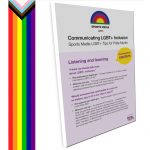Stories can give strength to gay and bi footballers
As CBBC football drama Jamie Johnson introduces a gay storyline during Pride Month, the media is still learning what positive support looks like…
By Jon Holmes

Players who wear their hearts on their sleeves will always be popular figures in football.
On Thursday, viewers of CBBC football drama Jamie Johnson watched teenager Dillon – one of the show’s main characters – inspire his Phoenix FC team-mates to cup final success. Later in the episode, he came out as gay to new guy in town Elliot.
As seen in the show, channelling his aggression positively helps to make Dillon (played by Patrick Ward) both a talent and a winner. However, hidden from view is his struggle for self-acceptance.
Initially, he is rattled by the presence of Elliot (Laquarn Lewis), leading to accusations of homophobia and some cold-shoulder treatment. It turns out that Dillon is in fact trying to emulate Elliot’s confidence, eventually telling him: “My problem’s not with you… it’s with myself.”
Coronation Street recently explored a similar theme, as Weatherfield County FC’s James Bailey grappled with his sexuality. In Jamie Johnson, it’s a younger audience that’s being invited to empathise with a male footballer who wants to come out.
In real life, there remains intense interest in the scenario of a professional player who’s a gay or bi man sharing their truth. A year ago, a Twitter account purporting to be from a Championship footballer accumulated 50,000 followers in a matter of weeks. Meanwhile, in the last month or so, The Sun has published seven articles, interviews and opinion columns related to the suggestion that now might be an ideal time for a gay or bi player to step forward publicly.

We could all do with a good news story at the moment – and with it being Pride Month, even more so for LGBT+ people – and you only have to think back to two years ago when Collin Martin came out publicly in Major League Soccer to worldwide goodwill to understand the power that visible representation still has in sport.
However, it’s important to note that the midfielder wasn’t in the same headspace as either Dillon or Corrie‘s James when he decided to tell the world via social media that he’s gay. He was more like Elliot, at ease with himself and relaxed, having already taken ownership of that part of his identity and reached the necessary level of comfort.
The acceptance of friends, family, team-mates – all the people important in his life – brought Martin to a point where he felt ready to stand out in men’s football. One additional factor was the LGBT+ good-causes fundraiser ‘Playing For Pride’, publicly supported then and now by Martin’s Minnesota United team-mate Eric Miller and over 100 players of other clubs in the US.
In both the Jamie Johnson and Corrie storylines, the footballers in question search for signs of support, particularly from their fathers. The reaction of parents is often crucial – the 2018 movie Love, Simon has helped many young people navigate those difficult conversations with mum and dad (a spin-off TV series Love, Victor – coming soon to the UK – promises to do the same). As for gay and bi players in British men’s football who are thinking about taking a public platform, there are other pillars of support to think about – and the media is one of those.

At the start of the recent trend in tabloid coverage, it was reported that five such players were in counselling; within a fortnight, that number had apparently risen to seven. An editorial the same day claimed that with no fans present in stadiums due to coronavirus, it was “an open goal” for any player who wanted to come out. A few days later, Luke Tuffs – the manager of non-league Ashford Town FC, and one of the few out gay men in the UK game – explained in an interview with Adrian Chiles that it wasn’t that simple. A more likely scenario, said Tuffs, is that a youth player comes out while on their way up: “That will happen because that generation are getting cooler with it all the time.” A follow-up conversation on this between Tuffs, Chiles, Charlie Webster and Proud Canaries’ Di Cunningham on BBC Radio 5 Live is well worth a listen (from 1:41:00).
On June 14, The Sun on Sunday ran a story with the headline ‘Gay footballers to be offered counselling if they decide to come out’; and the next day, readers were informed that a ‘Premier League ace is ‘terrified’ to come out as gay because he fears football backlash’ – a silhouette picture was used to illustrate the need for secrecy. It sounds like a very different sporting environment to that of Minnesota, where Martin was able to arrive at his own sense of pride, trusting that the wider MLS family of players, staff and fans would be in his corner when the time felt right for him to be more open with them.

In the Jamie Johnson storyline, there’s a deeper bond growing between Dillon and Elliot (or ‘Delliot’, as some of the show’s fans have already tagged their blossoming relationship). Falling in love is a situation that can happen to anyone and it’s also the kind of life-changing event that might cause a gay or bi male player to consider coming out. For most people, the strength and security you get from being in a relationship makes that something you want to share with others; there are, of course, lots of examples of this in the women’s game.
While men’s football culture doesn’t exactly encourage that kind of announcement just yet, stories like Tuffs’ and the narratives in Jamie Johnson and Corrie are reflecting wider society and are helping the game to catch up.
If it is the media that is holding someone back – perhaps due to the pressure, perceived or otherwise, of being in that intense spotlight – then the media has a responsibility to change if it’s serious about helping to create a welcoming environment. There has been renewed talk recently of a road map project drawn up with governing bodies and relevant organisations. As a network of LGBT+ people and active allies working in sports media and connected roles, our group appreciates how the difficult coming out process could be aided by that road map, and help editors and journalists to cover the topic with sensitivity.
We’ve suggested an approach through our ‘Rainbow Ready’ media resources pack, endorsed by leading LGBT-inclusive organisations Pride Sports UK, LEAP Sports Scotland and LGBT Sport Cymru, as well as fellow network groups BCOMS and InterMediaUK. The guide advises all working in media and comms on how to best assist LGBT+ people in sport who have a personal message they want to share more widely.

Sports Media LGBT+ has also produced an additional resource specifically for Pride Month, as a follow-up from a webinar recently delivered for Pride Sports UK and the Sport and Recreation Alliance, on how to start conversations about LGBT+ inclusion in environments such as football clubs; agree objectives on how to create truly welcoming spaces for all; and produce content which reflects that.
We believe that media organisations can demonstrate a similar understanding of the complex challenges faced by gay and bi male pro footballers who are navigating the coming out process, by adopting a strategy that is not only supportive in tone but also seeks to avoid encouraging any speculation.
We welcome vocal support for any such player, whether still active or retired; we understand the importance of building trust with the media; we recognise the responsibility our industry has – not to shine a searchlight, but to contribute to a road map which shows how we can all make progress together.
As the complex journey continues for Dillon in Jamie Johnson, both entertaining and educating its young audience, those in the media who are chasing real-life stories about gay and bi male footballers would be wise to take a look. The problem might not lie with those players – it could be with you.
Further reading…
Rainbow Ready: Media resources for communicating LGBT+ inclusion


